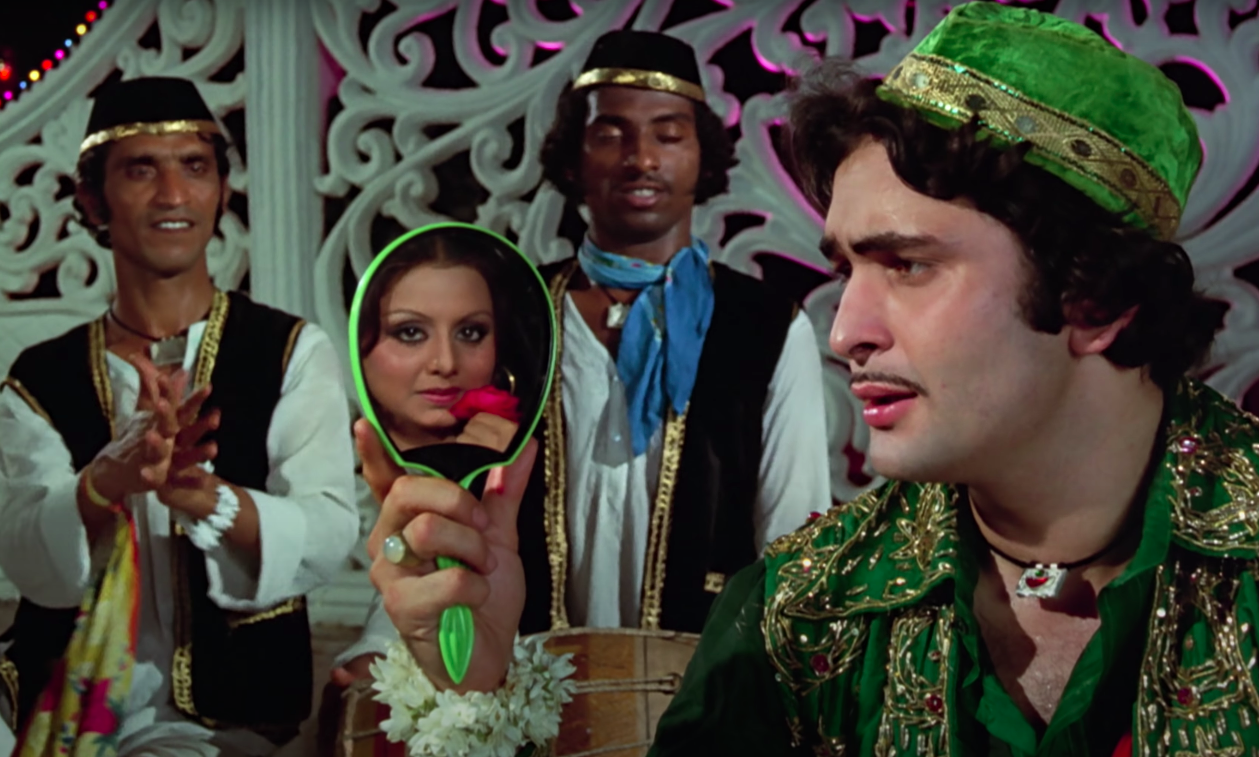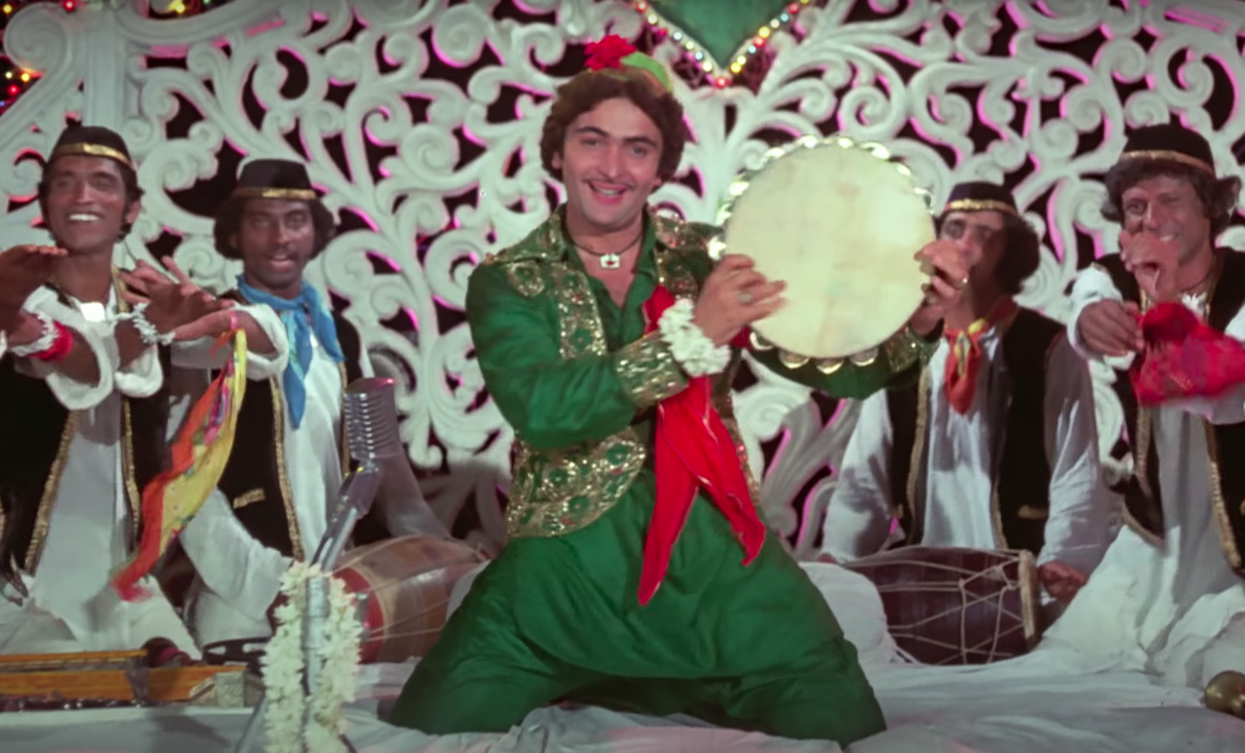
Rishi Raj Kapoor died at the age of 67 on April 30th, 2020 after a two-year struggle with acute myeloid leukemia. He is best known for his work as a leading hero in over one hundred Bollywood films including his debut role in Bobby (1973), Karz (1980), Saagar (1985), and Chandni (1989) among many others.
Today, we present the lyrics and English translation to pardaah hai pardaah from Amar Akbar Anthony (1977), which remains one of the most cherished performances by Bollywood’s original chocolate boy.
Directed by Manmohan Desai, Amar Akbar Anthony is an ode to secularism and religious tolerance that tells the story of of three brothers separated during childhood. Amar, played by Vinod Khanna, is the eldest Hindu-born brother who grows up to become a policeman. Anthony, played by Amitabh Bachchan, is the middle brother who becomes a practicing Christian and works as a liquor dealer. Finally, Akbar played by Rishi Kapoor, is the youngest brother who goes on to become a Muslim qawwali singer. Following a host of complicated turns and twists, the three brothers are reunited many years later after discovering their mutual roots.
In this film, Rishi Kapoor gives one of his most memorable performances in the beloved qawwali “pardaah hai pardaah.” Sung during his late-70’s comeback, Mohammad Rafi deserves equal praise for his expressive vocals under the direction of music composer duo Laxmikant-Pyarelal. Although the remainder of the soundtrack’s lyrics are standard Bollywood masala fare, Anand Bakshi’s lyrics for this number are exquisitely penned surrounding the common man-unveils-woman trope (see parde me.n rahne do, yeh jo chilman hai). With the use of words like shabaab, shahazaadii, and mahjabii.n, you might want to brush up on your Urdu vocabulary with our glossary provided below.
Need another movie to add to your quarantine watch list? Pay your tribute to the departed Mr. Kapoor and look no further than Amar Akbar Anthony – the full movie can be found here!
-Mr. ’55
R.I.P. Rishi Kapoor (1952 – 2020)

Parda Hai Parda: Lyrics and English Translation
MR: shabaab pe mai.n zaraa-sii sharaab phai.nkuu.ngaa I shall pour some wine over this youth. kisii hasii.n kii taraf yeh gulaab phai.nkuu.ngaa I shall throw this rose toward a beauty. pardaah hai pardaah, pardaah hai pardaah There is a veil, there is a veil. parde ke piichhe pardaanashii.n hai There is a woman behind the veil. pardaanashii.n ko bepardaah na kar duu.n to If I do not unveil the woman behind the veil... Akbar meraa naam nahii.n hai! then my name is not Akbar! mai.n dekhtaa huu.n jidhar, log bhii udhar dekhe.n Wherever I look, people look in the same direction. kahaa.n Thahartii hai jaa kar merii nazar dekhe.n They look at where my gaze stops. mere khvaabo.n kii shahazaadii, mai.n huu.n Akbar ilaahabaadii Oh, the princess of my dreams! I am Akbar of Allahabad. mai.n shaayar huu.n hasiino.n kaa, mai.n aashiq mahjabiino.n kaa I am a poet of beauty. I am a lover of beautiful women. teraa daaman na chhoDuu.ngaa, mai.n har chilman ko toDuungaa I shall not leave your side. I shall tear every curtain between us. na Dar zaalim zamaane se, adaa se yaa bahaane se Do not fear this cruel world. By grace or pretense, zaraa apnii suurat dikhaa de, samaa khuubsuurat banaa de please show your face and beautify the mood. nahii.n to teraa naam leke, tujhe koii ilzaam deke Otherwise I will sully your name with an accusation. tujhko is mahfil me.n rusvaa na kar duu.n If I do not dishonor you in this gathering... pardaanashii.n ko bepardaah na kar duu.n to If I do not unveil the woman behind the veil... AK: Akbar teraa naam nahii.n hai! then your name is not Akbar! MR: khudaa kaa shukr hai, chahraa nazar to aayaa hai Give thanks to the Lord, her face has been revealed! hayaa kaa rang nigaaho.n pe phir bhii chhaayaa hai Yet a tinge of modesty remains in her eyes. kisii kii jaan jaatii hai, kisii ko sharm aatii hai As I suffer, she shies away from me. koii aa.nsuu bahaataa hai, to koii muskuraataa hai As I shed tears, she cracks a smile. sataa kar is tarah aksar, mazaa lete hai.n ye dilbar My lover takes pleasure in torturing me so. yahii dastuur hai in kaa, sitam mashahuur hai in kaa Her cruel practices are known to all. khafaa hoke chahraa chhupaa le, magar yaad rakh husnvaale Hide your face in anger, my beautiful one, but remember this: jo hai aag terii javaanii, meraa pyaar hai sard paanii my love is like cold water for the fire of your youth. mai.n tere ghusse ko ThanDaa na kar duu.n haa.n If I do not calm your anger... pardaanashii.n ko bepardaah na kar duu.n to If I do not unveil the woman behind the veil... AK: Akbar teraa naam nahii.n hai! then your name is not Akbar! MR: pardaah hai pardaah, pardaah hai pardaah There is a veil, there is a veil. *MR = lines sung by Mohammed Rafi, AK = lines sung by Amit Kumar
GLOSSARY
shabaab: youth; sharaab: wine, alcohol; phainknaa: to throw; hasii.n: beautiful one; gulaab: rose; pardaah: veil; pardaahnashii.n: veiled woman; bepardaah karnaa: to unveil; Thaharnaa: to stop; khvaab: dream; shahazaadii: princess; illahabaadii: from Allahabad, a city in the Indian state of Uttar Pradesh; shaayar: poet; aashiq: lover; mahjabii.n: moon- like beauty; daaman chhoDnaa: to leave one's side; chilman: curtain; zaalim: cruel; zamaanaa: world; adaa: grace; bahaanaa: pretense; suurat: face; samaa: ambience, atmosphere; khuubsuurat banaanaa: to beautify; ilzaam: accusation; mahfil: gathering: rusvaa karnaa: to dishonor; shukr: thanks; chahraa: face; hayaa: modesty; nigaahe.n: eyes; sharm aanaa: to feel shy; sataanaa: to torture; mazaa lenaa: to take pleasure; dilbar: lover; khafaa: angry; husnvaale: beautiful one; aag: fire; javaanii: youth; sard: cold; ghussaah: anger.
















